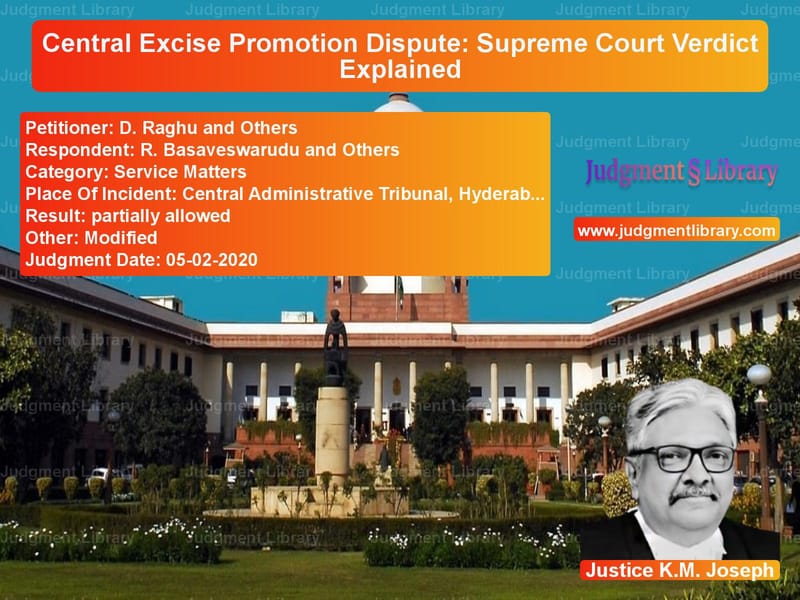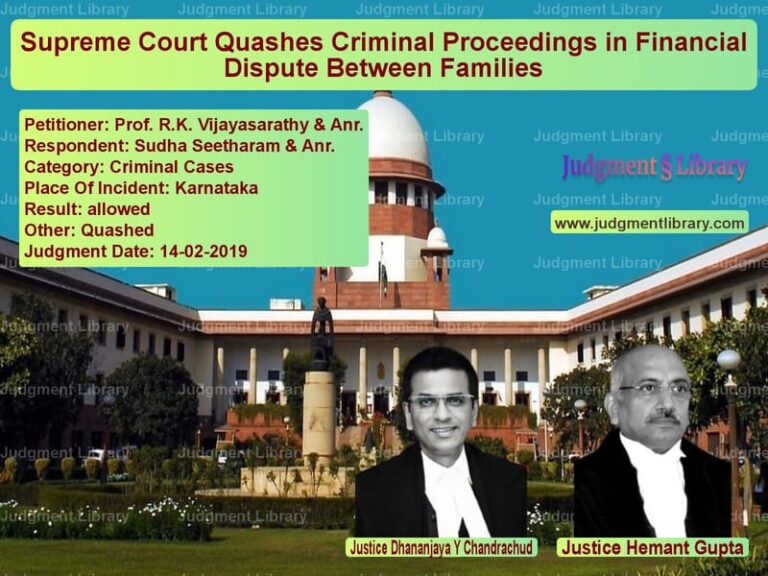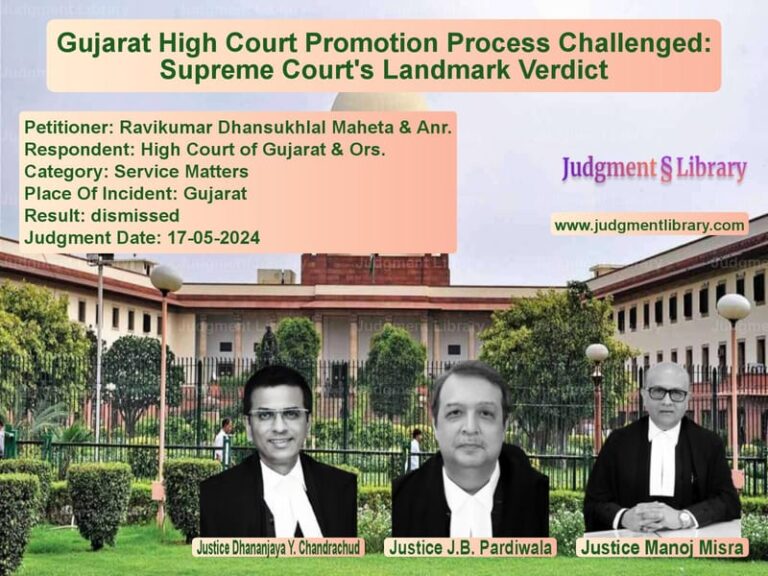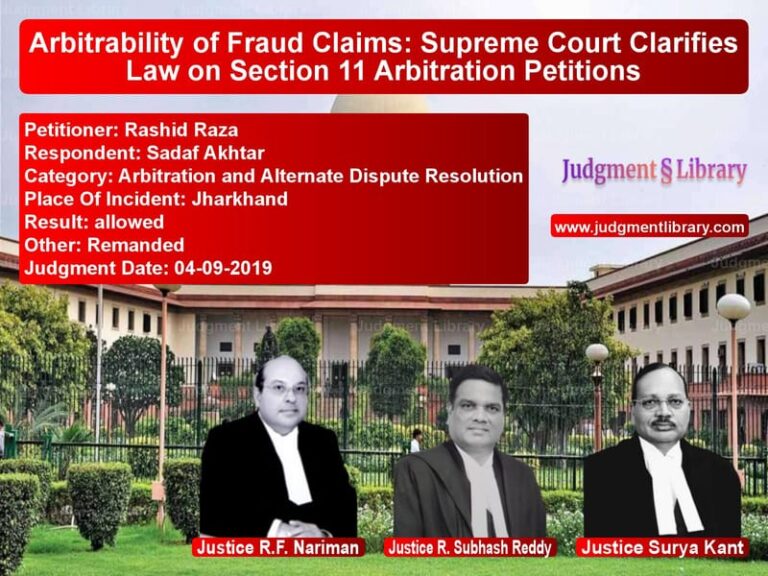Central Excise Promotion Dispute: Supreme Court Verdict Explained
The case of D. Raghu and Others vs. R. Basaveswarudu and Others is a significant judgment that clarifies the promotion rules in the Central Excise Department. The issue revolves around whether Data Entry Operators (DEOs) in Grade ‘B’ were eligible for promotion to the post of Inspector under the newly framed recruitment rules. This case has far-reaching implications for government employees seeking promotions within their departments.
The dispute began when certain DEOs challenged a notice issued by the authorities that excluded them from consideration for promotions to the post of Inspectors in the Central Excise Department. The notice, issued on November 5, 2002, confined promotions only to certain categories of employees, leading to the filing of this case before the Central Administrative Tribunal (CAT), Hyderabad. The CAT ruled in favor of the petitioners, leading to an appeal before the Supreme Court.
Background of the Case
The cadre restructuring in 2001 led to changes in the promotion rules, affecting employees in different categories. The petitioners, who were originally recruited as Data Entry Operators (DEOs) Grade ‘A’ and later promoted to Grade ‘B,’ found themselves ineligible for further promotion as Inspectors due to administrative changes.
The case involved two sets of promotions:
- Promotion to the post of Inspector of Central Excise, which was the central point of contention.
- Promotion to the post of Upper Division (UD) Clerk and Tax Assistant, which was also disputed but handled separately.
Arguments by the Petitioner
The petitioners, who were mainly Data Entry Operators (DEOs), argued that:
- Their cadre was unfairly excluded from eligibility for promotion to the post of Inspector.
- The cadre restructuring of 2001 should have automatically made them eligible for promotion.
- The recruitment rules should be interpreted in a broad manner that does not discriminate against DEOs.
- The principle of equal opportunity in promotions was being violated by restricting eligibility to only certain cadres.
- The notice issued on November 5, 2002 was arbitrary and lacked justification.
Arguments by the Respondent
The respondents, including government authorities, countered these claims with the following arguments:
- The recruitment rules explicitly listed the categories eligible for promotion, and DEOs were not included.
- The cadre restructuring was aimed at streamlining the promotion process, not expanding eligibility.
- Allowing DEOs to be promoted as Inspectors would disrupt the administrative structure and create anomalies in seniority.
- The Tribunal’s ruling, which favored the petitioners, was inconsistent with service jurisprudence.
- The petitioners still had promotional opportunities within their cadre, and their claims were not justified.
Supreme Court’s Observations
The Supreme Court undertook a detailed examination of the recruitment rules and the policy behind cadre restructuring. Some key observations made by the Court included:
- The restructuring of a cadre does not, by itself, create new avenues for promotion unless explicitly mentioned in the rules.
- The recruitment rules clearly defined the categories eligible for promotion, and DEOs were not among them.
- The exclusion of DEOs was not arbitrary; rather, it was a conscious policy decision made by the administration.
- The Tribunal’s decision to include DEOs in the Inspector promotion list was not in accordance with the established principles of service law.
- Promotion policies must be implemented in a manner that maintains consistency and does not create confusion in government service structures.
Key Judicial Statements
The Supreme Court made some crucial remarks regarding the principles of promotion and cadre restructuring:
“The policy of promotion within government service must align with recruitment rules and cannot be altered by judicial interpretation unless there is a clear violation of constitutional provisions.”
Further, the Court stated:
“The restructuring of a cadre does not, by itself, create new avenues for promotion unless expressly provided in the rules governing the service.”
Final Verdict
The Supreme Court partially allowed the appeal, modifying the Tribunal’s ruling. The key takeaways from the judgment are:
- DEOs cannot be automatically included in the promotion channel for Inspectors unless explicitly mentioned in recruitment rules.
- Government departments must follow clear guidelines in implementing recruitment policies to avoid confusion.
- Administrative restructuring must be carried out in a manner that does not create unnecessary disputes and must be clearly communicated to all employees.
- The petitioners were allowed to seek promotions within their existing cadre based on their service rules, but they could not claim eligibility for the post of Inspector.
This judgment serves as an important precedent for future cases involving cadre restructuring and promotions within government service. It reaffirms that recruitment and promotion policies must be implemented strictly in accordance with established rules, ensuring clarity and consistency in government employment structures.
Petitioner Name: D. Raghu and Others.Respondent Name: R. Basaveswarudu and Others.Judgment By: Justice K.M. Joseph.Place Of Incident: Central Administrative Tribunal, Hyderabad.Judgment Date: 05-02-2020.
Don’t miss out on the full details! Download the complete judgment in PDF format below and gain valuable insights instantly!
Download Judgment: D. Raghu and Others vs R. Basaveswarudu and Supreme Court of India Judgment Dated 05-02-2020.pdf
Direct Downlaod Judgment: Direct downlaod this Judgment
See all petitions in Employment Disputes
See all petitions in Promotion Cases
See all petitions in Public Sector Employees
See all petitions in Judgment by K.M. Joseph
See all petitions in partially allowed
See all petitions in Modified
See all petitions in supreme court of India judgments February 2020
See all petitions in 2020 judgments
See all posts in Service Matters Category
See all allowed petitions in Service Matters Category
See all Dismissed petitions in Service Matters Category
See all partially allowed petitions in Service Matters Category







